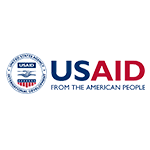Leveraging Peer Influence to Encourage Vaccine Uptake in Liberia
HIGHLIGHTS
- Many Liberians remain hesitant to receive a COVID-19 vaccine.
- Health workers are a priority group for encouraging widespread vaccine uptake, both for their frontline role and social influence.
- We developed solutions that raise the visibility of vaccinated health workers among their peers, seeking to counter misinformation and increase confidence in the vaccine.
The Challenge
In an Afrobarometer survey conducted between October 2020 and January 2021, 75% of Liberians felt the COVID-19 pandemic would be not very serious or not at all serious for Liberia over the subsequent six months and 86% believed prayer would be more effective than a vaccine against COVID-19.
Since the initial COVID-19 vaccines were distributed to Liberia through the COVAX initiative, health workers have been a priority group for vaccination—both for their role as frontline workers and the social influence they have on the general public’s perception of vaccines. Understanding and designing solutions for the behavioral challenges related to health workers’ acceptance and uptake of the vaccine is an important step toward protecting the people on the front lines of the pandemic and achieving widespread vaccination.
Our Approach
From late June through September 2021, ideas42 and the USAID-funded Breakthrough ACTION project supported COVID-19 vaccine uptake efforts in Liberia, targeting behavioral challenges to vaccine acceptance and uptake among facility-based health workers in Montserrado and Margibi counties. We first conducted a landscape literature review and qualitative interviews with vaccinated and unvaccinated health workers and several stakeholders involved in the national vaccine roll-out. Guided by these behavioral insights into barriers and channels to vaccination, we worked with national and county health teams and health workers to develop and refine prototype solutions and recommendations for implementation.
Results
We found that concerns around vaccine side effects—and the disproportionate skew of news and social media highlighting negative side effects or rare outcomes—lead many health workers to defer vaccination due to the perceived risks. While awareness of positive vaccination experiences among their peers seems to play a significant role in health worker motivation, most workers had low visibility into the number of confirmed COVID-19 cases in their area, which reduced perceived urgency and the need to get vaccinated.
The final solution set included three components meant to raise the visibility of peers who have successfully vaccinated and counter misinformation undermining confidence in vaccination:
- A vaccine invitation card for health workers who have completed their full vaccine course to distribute to peers, highlighting the reasons why they got vaccinated and recommending they get vaccinated as well.
- Pins for health workers to wear while in the facility, signaling they have been vaccinated for COVID-19 and encouraging their peers to join them.
- An in-person healthcare provider forum hosted by the county health team, where influential health workers receive tailored health information, hear testimonials from peers, and ask questions to resolve their concerns before returning to their facility as a vaccine ambassador.
Takeaway
In a rapidly changing landscape, understanding and considering the behavioral challenges influencing vaccine acceptance and uptake are important to any country’s efforts to control the COVID-19 pandemic. Insights into hesitancy and uptake among health workers in Liberia may resonate for health workers in similar contexts and also foreshadowed the beliefs and concerns echoed among the general public once eligible for vaccination. As such, our implementation guide highlights opportunities to expand these targeted solutions to audiences beyond facility-based health workers as vaccine supply allows for wider distribution efforts.
Interested in our work applying behavioral science to global health? Email gh@ideas42.org or tweet at @ideas42 to join the conversation.
Partners








